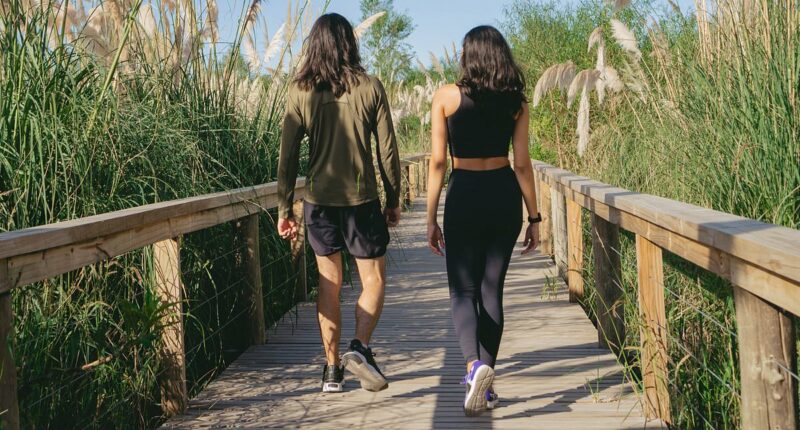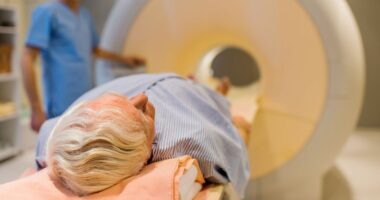Share this @internewscast.com
Leading doctors are highlighting how an unusual walking technique could help boost memory and stave off dementia.
Doctors Eve Glazier and Elizabeth Ko from the University of California, Los Angeles report that several studies indicate that walking backwards, also known as ‘retro walking’, can enhance cognition and stimulate the prefrontal cortex, the brain area linked to decision-making, problem-solving, and working memory.
They write: ‘That is the region of the brain associated with problem-solving, logic and making decisions.
One fascinating study revealed that participants who merely imagined themselves walking backward while actually remaining seated improved their performance on memory tests.
The exact scientific mechanism behind how retro walking improves cognition isn’t fully understood.
However, researchers hypothesize it is linked to the brain working harder or in a more complex way to process and carry out the unfamiliar movement.
Studies have shown benefits from as little as 10 to 15 minutes of daily backward walking.
But Dr Glazier and Dr Ko note that caution is needed to avoid injury due to potential balance issues or obstacles that are tricky to see.

Drs Glazier and Ko, based at UCLA, emphasize that these studies demonstrate the benefits of retro walking for boosting cognitive functions.
They suggest using a treadmill for this activity, as it offers a stable base and allows for maintaining a consistent and controlled pace.
If you don’t have access to a treadmill, the health experts recommend working with a partner who can guide you.
In a 2025 study out of Dayananda Sagar University in India, researchers found that retro walking had a significant impact on cognitive ability.
For the investigation, 36 participants aged 65 to 75 were recruited and underwent retro walking training three times a week for six weeks.
Each exercise session lasted 30 minutes and they included four-minute retro-walking sets with five-minute rest intervals.
Under professional supervision, participants walked backward on a flat surface, maintaining a steady pace to prevent falls.
The intensity was progressively increased as they gained confidence and proficiency.
Additionally, they were encouraged to continue the practice outside of the supervised sessions on their own at home.

A study conducted in 2025 at Dayananda Sagar University in India showed that retro walking notably enhanced cognitive abilities, using marked pathways for training as illustrated above.
At the end of the study, tests for cognition were repeated.
Cognitive functions were assessed with the Montreal Cognitive Assessment (MoCA) scale, measuring various domains like memory, attention, language, and executive functions.
The MoCA score ranges from 0 to 30, with higher scores indicating better cognitive performance. At the end of the study, the average score increased by almost three points, from 25 pre-test to 27.7 post-test.
A score of 25 indicates that further assessments are required and a person may have mild cognitive impairment, a precursor to dementia. A score of 27 or higher is considered normal or healthy with no signs of cognitive decline.
The researchers concluded: ‘Cognitive decline is a major concern in the geriatric population, with physical exercise being a well-established intervention for cognitive preservation.
‘The significant improvement in MoCA scores from pre-test to post-test suggests that retro-walking positively influences cognitive function.
‘Previous research has indicated that engaging in dual-task exercises, such as walking while maintaining balance, stimulates cognitive processing and enhances executive function.
‘Retro-walking demands increased attention and coordination, potentially explaining the observed cognitive improvements.’

The researchers also highlight that cognitive impairment is becoming more common among older adults, driven by the aging global population and the increasing prevalence of age-related neurodegenerative conditions such as Alzheimer’s disease and other types of dementia.
Alzheimer’s disease is one of the most common forms of dementia and mostly affects adults over the age of 65.
About 7million people in the US 65 and older live with the condition, and over 100,000 die from it annually.
The Alzheimer’s Association estimates that by 2050, nearly 13 million Americans will be living with the disease.
Along with having a beneficial effect on cognitive health, retro walking has also been found to have many other benefits.
Dr Glazier and Dr Ko wrote: ‘It can strengthen the muscles in the back; increase strength and flexibility in the hamstrings; strengthen the ankles; improve balance, posture and coordination; and even ease lower back pain.
‘Due to a decreased range of motion in the knees and hips, retro walking can be kinder to those joints.’
Walking backward can also increase the energy you use by 40 percent, upping calorie burn.
And without being able to see in front of you, your body has to rely more on something called proprioception, the built-in sense of where you are in space. This can fine turn coordination and stability and strengthen your ability to focus.
Better stability and balance is crucial in older adults as it can prevent falls and the potentially deadly complications that result.

















